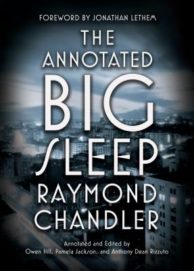 Raymond Chandler
Raymond Chandler
Vintage Crime/Black Lizard ($25)
by Ryder W. Miller
In his Forward to The Annotated Big Sleep, a hefty tome that contains almost equal amounts of commentary as story text, Jonathan Lethem writes, “The replacement of our intuitions of these things with firm knowledge creates a breathtaking effect.” Indeed, this classic book, as annotators and editors Owen Hill, Pamela Jackson, and Anthony Dean Rizzuto demonstrate, did not come out of thin air. As Lethem says, “these notes entrench the novel in an intricate social and urban-developmental history of Los Angeles that hides from us, increasingly, in time’s back pages.”
Page by page, the editors (a crime novelist, a scholar, and a poet) help the reader understand and contextualize Raymond Chandler’s 1939 noir classic. Chandler was born in Chicago, lived and studied in England, and moved back to the U.S. to wind up in a seamy Los Angeles. Sacked from his job as an oil company executive, he turned to writing, and The Big Sleep was his first novel. Its star—detective Philip Marlowe, a modern knight errant of sorts—has become a crime fiction icon. Chandler was not a detective himself like Dashiell Hammett from up north, but he elevated the genre for those who appreciated his stylistic and literary accomplishments. Two movies have been made of The Big Sleep, and most of the books featuring the hardboiled Marlowe have also made it to the big screen.
From The Annotated Big Sleep one gets a profound sense of where Marlowe’s adventures took place and the meaning of the language that is used; a great deal of crime world and police detective slang is defined here. There is also a lot of information about the locale Chandler wrote about and lived in during the last chapters of his life. One might prefer to enjoy the novel without the commentary, of course, but for those who want to “read” the book in the academic sense, these annotations make it easy. With eighty years having passed, much has changed, including the language, the scenery, and the moral landscape.
In short, this is a great book for those who want to study the text. There is much here that will fascinate those who are interested in the author and the genre, with asides about many things, including Chandler’s influences (and influence), literary self-cannibalism, publishing landscape, and perspective. It’s fascinating noir fun for those who want to explore the field, which some will now find much less baffling because of the efforts here.
